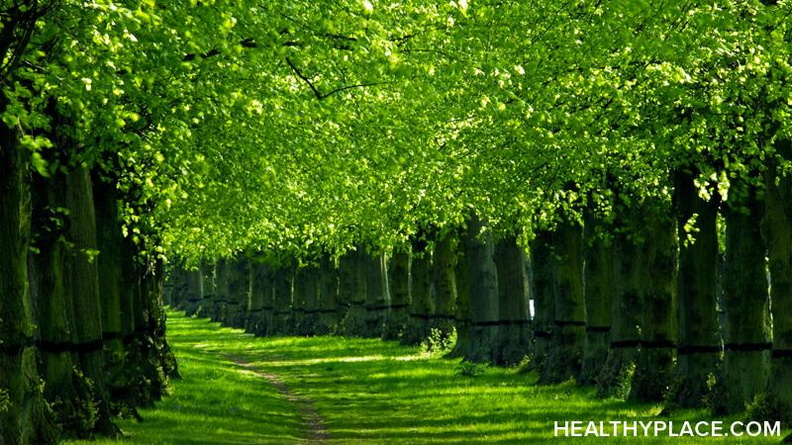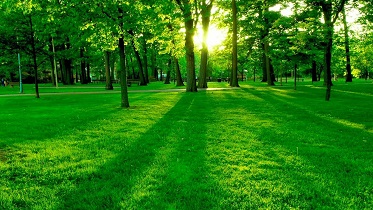Nature Reduces Anxiety, So Get Outside for Peace of Mind

Did you know you can reduce anxiety be getting out into nature? If you experience anxiety, chances are, you want anxiety to get out of your life. You can actively take charge in a very pleasant way--by using nature. Read on to learn how nature reduces anxiety and simple ways to use it.
Anxiety, and its partner-in-crime, stress, (The Difference Between Anxiety and Stress) tend to cling to us like soda clings to a movie theater's floor and, thus, our shoes. When we walk around a theater, we experience the stickiness. When we leave, though, the sticky soda eventually wears off.
What if we apply the same principle to anxiety? What if we were to step away from where we are; what if we were to get out for awhile? To decrease anxiety and enhance overall mental health and wellbeing, it's important to get out into nature.
How Nature Reduces Anxiety
Research1,2 indicates that getting out into nature reduces anxiety and enhances mental health and wellbeing. Getting out into nature has a positive impact on us.
- Nature relaxes the mind, thus reducing feelings of stress and anxiety.
- Being in nature reduces the amount of stress hormones, like cortisol, in our system.
- Experiencing nature increases the activity of the parasympathetic nervous system, the part of the nervous system responsible for digestion and rest; part of its activity involves slowing the heart rate. When the parasympathetic nervous system is active, physical side effects of anxiety decrease and subjective feelings of peace and relaxation increase.
- Getting out into nature reduces anxiety by decreasing activity in the part of the brain's prefrontal cortex that is active when we ruminate. One of the features of anxiety is rumination, seemingly endless worries and what-ifs. So to create a welcome break from anxiety's rumination, get out and go experience nature.
Getting Out into Nature Doesn't Have to Provoke Anxiety
 Getting out into nature doesn't have to be anxiety-provoking. You don't have to pressure yourself into thinking you "should" do something fancy and elaborate. A few ideas to help you get out and reduce anxiety include:
Getting out into nature doesn't have to be anxiety-provoking. You don't have to pressure yourself into thinking you "should" do something fancy and elaborate. A few ideas to help you get out and reduce anxiety include:
- Take breaks during the day to step outside, breathe deeply, and go for a short walk. Listen to the sounds of birds, a breeze, and more. According to researchers, the greener you can go, the better for your brain. A backyard or park is more effective for reducing anxiety than a busy, city street.
- Make it a regular habit to create time to get out and be active. Hiking, biking, gardening (even in flower pots if you don't have a yard), picnicking, and more can be simple and soothing.
- When you can't get out, looking at pictures of nature and listening to soothing nature sounds can offer anxiety-reducing benefits, too.
I invite you to tune into the below video for more thoughts and ideas on getting out into nature reduces anxiety.
References
- Jordan, R. (2015). Stanford researchers find mental health prescription: nature. Stanford News.
- Rodriguez, T. (2013). The mental health benefits of nature exposure. Psychiatry Advisor.
Let's connect. I blog here. Find me on Facebook, Twitter, LinkedIn, Instagram, and Pinterest. My mental health novels, including one about severe anxiety, are here.
APA Reference
Peterson, T.
(2016, May 26). Nature Reduces Anxiety, So Get Outside for Peace of Mind, HealthyPlace. Retrieved
on 2026, January 10 from https://www.healthyplace.com/blogs/anxiety-schmanxiety/2016/05/anxiety-get-out
Author: Tanya J. Peterson, MS, NCC, DAIS
Research reveals that environments can increase or reduce our stress, which in turn impacts our bodies. What you are seeing, hearing, experiencing at any moment is changing not only your mood, but how your nervous, endocrine, and immune systems are working.The stress of an unpleasant environment can cause you to feel anxious, or sad, or helpless. This in turn elevates your blood pressure, heart rate, and muscle tension and suppresses your immune system. A pleasing environment reverses that.And regardless of age or culture, humans find nature pleasing. In one study cited in the book Healing Gardens, researchers found that more than two-thirds of people choose a natural setting to retreat to when stressed.
Hello Health Sciences,
Thank you so much for contributing this great information!
There is no doubt that walking or jogging in greenery environments helps reduce anxiety and depression. A person really needs to get out. Depression often leaves you feeling like doing nothing. Walking around the greenbelt does sooth the soul and mind. But then you still have to go out into the rat race.
Hi John,
Wouldn't it be nice if we could get out and stay out -- to avoid the rat race?! You're right that we do have to re-enter it, but getting out does make things easier to manage.